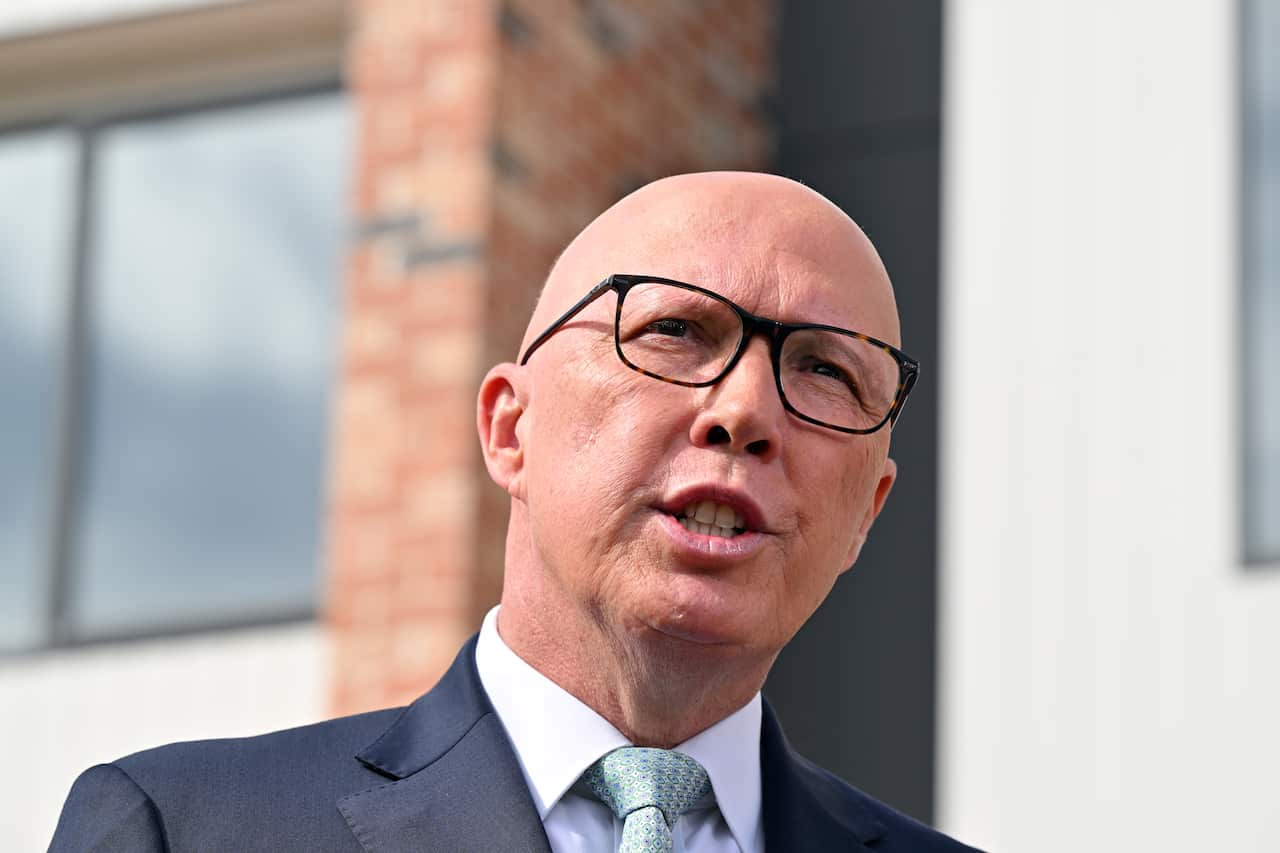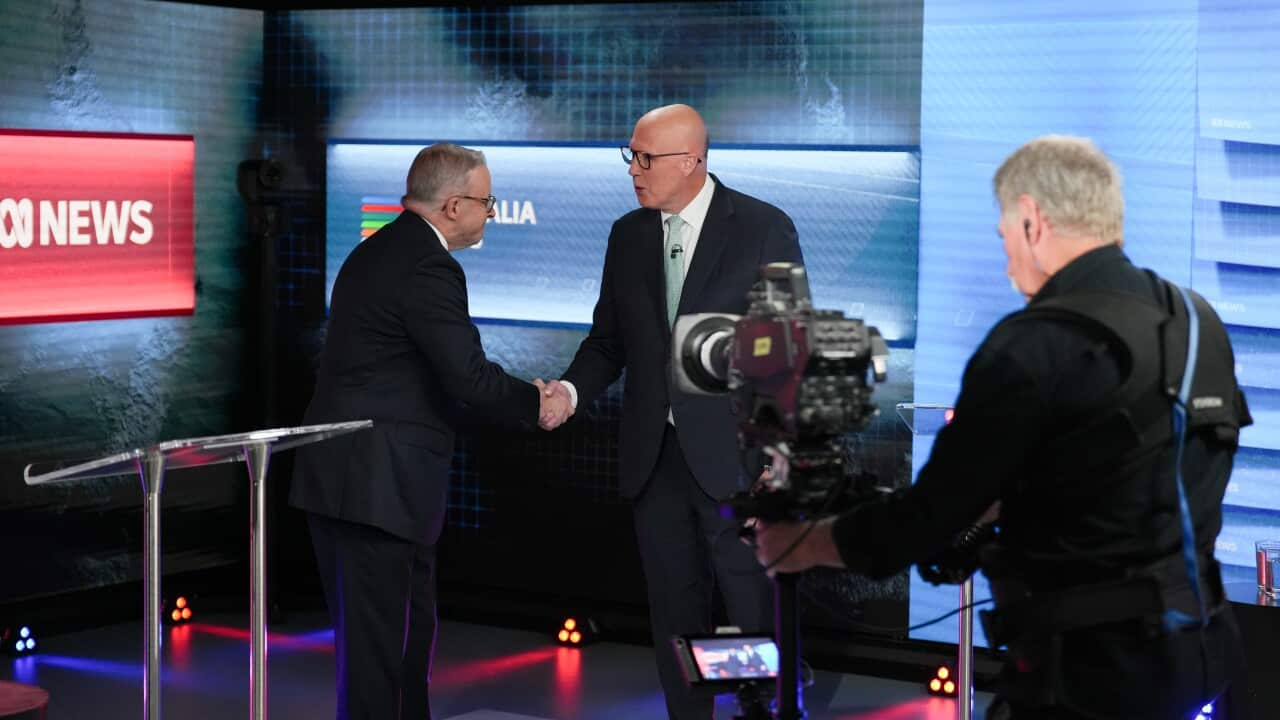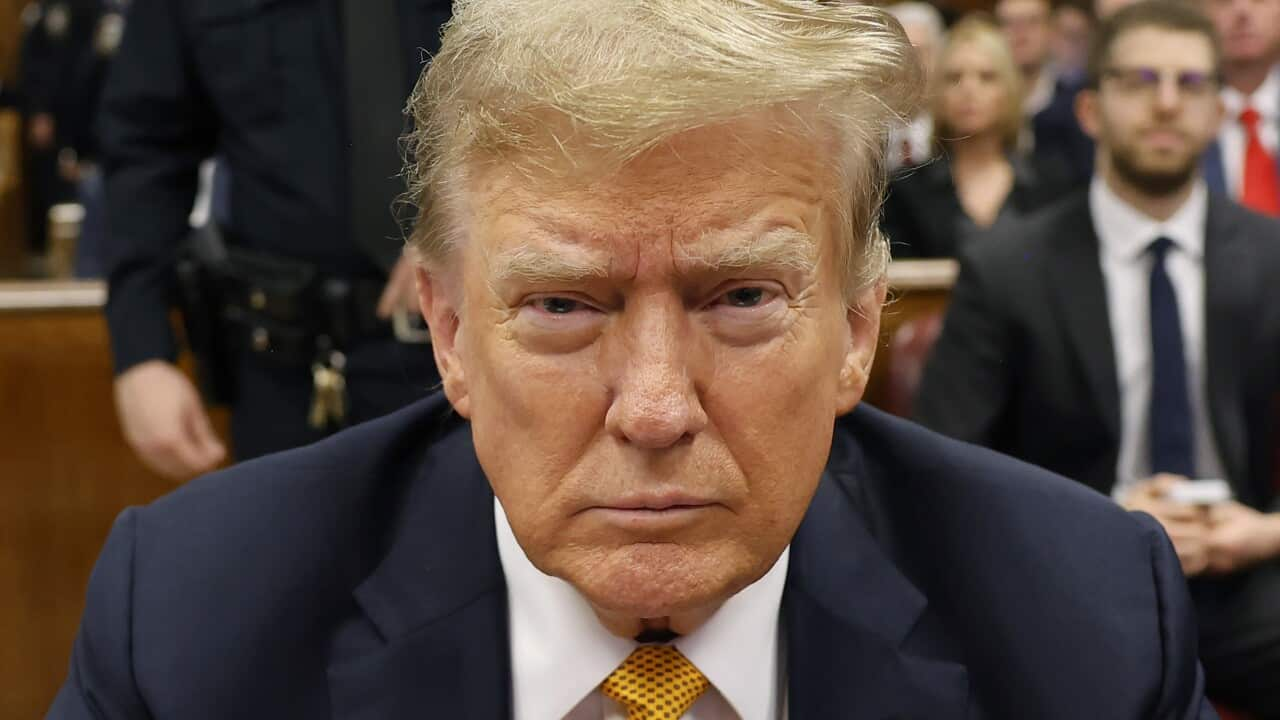As political leaders in hard hats marched through the nation’s construction sites, keen to sell their freshly minted multi-billion dollar housing policies, the spectre of Russia building its presence in the region was rapidly overtaking the narrative.
On Tuesday, Prime Minister Anthony Albanese took reporters travelling on the campaign bus to the Melbourne suburbs to herald a housing project that was close to completion — moving to neutralise the Coalition's claim the government hasn't turned its ambitions to build homes into a reality — in the middle of a housing crisis.
"Now, the Coalition pretend that houses aren't being built. You are here," Albanese said.

The report about Russia's attempts to base long-range aircraft in Indonesia sparked a heated political debate on the campaign trail. Source: AAP / Lukas Coch
Initially, it was Albanese trying to stick to a rehearsed message about efforts by Australian officials to clarify the reports, alongside underscoring the strength of the relationship with Indonesia. But that left questions unanswered, and a void for the Opposition to fill.
Opposition leader Peter Dutton quickly got a shovel out, but in doing so managed to make a significant misstep of his own.
Janes reported that sources from within the Indonesian government had confirmed that the request had been made in February to the office of Indonesian defence minister Sjafrie Sjamsoeddin following his meeting with Russia's Security Council secretary Sergei Shoigu.
The story referred to documents, which were not published, but purportedly showed Russia "seeks to base several long-range aircraft at the Manuhua Air Force Base, which shares a runway with the Frans Kaisiepo Airport".

Peter Dutton at a press conference after visiting a new Melbourne housing development on Wednesday. Source: AAP / Mick Tsikas
"I wanted to make a comment in relation to the reports around the Russian request with Indonesia," Dutton said.
"This would be a catastrophic failure of diplomatic relations if Penny Wong and Anthony Albanese didn't have forewarning about this before it was made public."
He went on to pose a question.
"Did the prime minister know about this before it was publicly announced by the president of Indonesia [Prabowo Subianto], and what is the government's response to it?"
While Dutton had the opportunity in an interview soon after and then a press conference the following day to correct the record, it wasn't until more than 24 hours later during the ABC leaders' debate that he conceded he had made an error.
"The reference I was making shouldn't have been to the [Indonesian] president. It was in relation to sources from the Prabowo government," he told moderator David Speers.
"So, was that a mistake?" Speers asked.
"It was a mistake. And I'm happy to admit that," Dutton replied.
Defence Minister Richard Marles had, by that point, issued a statement saying the Indonesian defence minister had given assurances Indonesia had not agreed to any request.
"I have spoken to my counterpart, HE Sjafrie Sjamsoeddin, the minister for defence, and he has said to me in the clearest possible terms, reports of the prospect of Russian aircraft operating from Indonesia are simply not true," Marles' statement read.
Albanese has consistently declined to say when he first became aware of the story, and after inspecting another construction site in Melbourne on Thursday morning, responded to intensive questioning.
"You're assuming the Janes report is correct and there is no basis for you assuming that," he said.
LISTEN TO

Party Time: The Players
SBS News
29:05
But Sergei Tolchenov, Russia's envoy to Indonesia, was soon issuing a statement of his own, backing the claims up and giving a justification for putting Australia in Russia's sights.
"Military cooperation is an integral part of the intergovernmental relations between the Russian Federation and the Republic of Indonesia. It is solely of bilateral character and based on a relevant legal framework and the national legislation of each respective country," Tolchenov reportedly said.
"When it comes to any challenges to regional stability, they are more likely to arise from the rotational deployment of large military contingents from extra-regional states on Australian territory, including the provision of airfields for the landing of strategic bombers and port infrastructure for visits by nuclear-powered submarines."
Russian cooperation is not a 'wild idea'
Indonesia has long promoted its status as unaligned and a friend to all nations.
But a series of events signalling a closer relationship with Russia have been under close watch.
David Andrews, senior manager for policy engagement at the Australian National University's National Security College, has been monitoring the unfolding story and said Russia seeking to use the base is plausible.
It's not the wildest idea in the world.
"It's maybe an evolution within that partnership, but it would take it a lot further than the current status of their relationship," Andrews said.
Indeed, the countries do have historical ties, Indonesia operates a number of Russian aircraft, and there have been joint Russian and Indonesian maritime exercises.
Indonesia has also formally signed up to BRICS, an international grouping that includes Russia, China and Iran.

Indonesian president Prabowo Subianto (left) shakes hands with first deputy prime minister of Russia Denis Manturov during a meeting this week. Source: AAP / Indonesian President Press Office/TASS/Sipa USA
"Australia doesn't want any nations that we would deem to be hostile or have interests inimical to ours being based in our near region.
"We're very comfortable with Southeast Asia being an area that is ideally free from strategic competition, and that states like Indonesia are able to exercise their rights and security independently of countries like Russia or China."
But he said the global security environment is changing.
Historically, we've been quite used to being a long way away from most of the major conflict zones of the past. That has shaped our psychology and our attitudes towards security in Australia — about that sense of isolation and protection by distance. That's no longer the case.
Russia has previously cosied up to Fiji too, and it's had an eye on the Pacific for some time.
The interest in a Russian base in Papua may not be primarily directed at Australia.
"It's about 1,900 kilometres from Guam, the big US base there in the Pacific," Andrews said.
"It would also put them in a position to observe or influence the broader US presence in the region, and to distract from some of their objectives."
Russia has form for meddling in foreign elections too, but Andrews said it's important to note the request was reported to have been made in February.
Russia is notorious for its disinformation, its misinformation, for its obfuscation, for its denying obvious realities.
"It's actually in some ways in their interests to be a bit obtuse and to not give a clear answer, because that means that we keep on second-guessing ourselves, that we get, sort of get in our own heads," Andrews said.
Russia has been a constant presence throughout the campaign, although very much in the background, until now.
has been a key factor in driving up energy costs across the world and contributing to economy-wide inflation in Australia. The tentacles of that have hit the housing industry hard.
Throughout this controversy, bemused tradies have looked on at the political circus whirling through their workplace. Once the campaign buses depart, they retrieve their tools to continue building.
It's a real-time display of the tension between domestic pressures to combat the housing shortage and questions about the foundations of the world order that are jockeying for prominence in this campaign.




